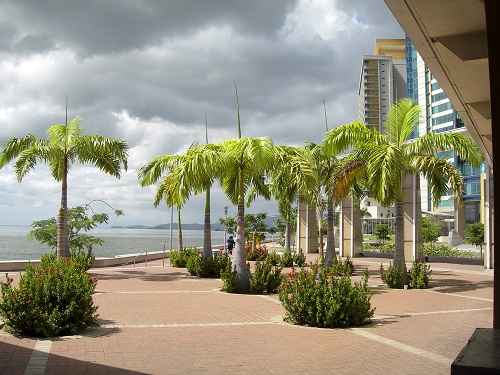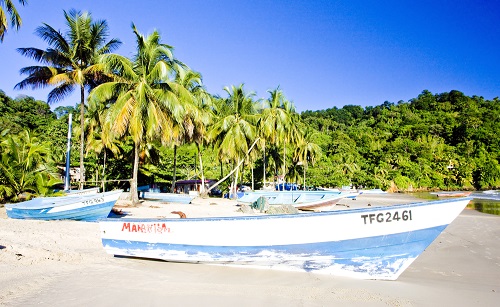Trinidad and Tobago consists of two main islands and is one of the most prosperous countries in the Caribbean. There are eight commercial banks operating there, with a network of over 123 branches, employing around 7,400 staff across the islands. The commercial banks remain the single largest group of financial institutions in terms of assets.The Central Bank of Trinidad and Tobago (CBTT), which was established in 1964, is the second-oldest central bank in the English-speaking Caribbean area. The primary functions of the Central Bank include determining rates and reserve requirements, formulating monetary policies, and generally overseeing and regulating all financial institutions and banks operating throughout Trinidad and Tobago.
Banking options for expats
It’s always a wise idea to retain your home country bank account, in addition to setting up a local account. There are many reasons why this is the best way forward when it comes to banking as an expat. For example, it will allow you to maintain credit ratings and credit history and to pay direct debits, standing orders, and bills. You will also often need a local account for salary payments, taxes, and utility bills.
In addition to your standard bank accounts (both in your home country and in your new location), you may want to consider a local savings account, if the perks look more appealing than what is offered back home.
There’s also the option of offshore banking, which many expatriates find is one of the best ways to save, as well as to protect their money from risk factors, such as political instability. The Caribbean is one of the top choices for expats and investors all over the world, when it comes to offshore accounts.

How to open a bank account in Trinidad and Tobago
First and foremost, all foreigners must declare their tax status. A foreigner can only open a bank account for themselves in Trinidad and Tobago if they are over the age of 18 years old. If they are under the age of 18 years old, they will need an account that is joined with an adult who fits the eligibility criteria (exact criteria may vary depending on the banking provider). The person looking to open a bank account will need to present any documentation that is requested, including any original documents that are required.
The banking provider ultimately has the right to request any additional information or documentation that they deem necessary. A foreigner wishing to open a bank account will need to go to the local branch of their chosen bank with any documents that are needed, along with valid photo identification. Some banks may require you to make an appointment beforehand, so it is best to look at this first, and also check the individual bank’s prerequisites.
You can usually find an information section on bank websites, or call the branch to speak to a customer service advisor. If for any reason you are unable to produce original documentation when this is requested, it is possible to provide copies that have been certificated at your local embassy.
You will also need proof of a residential address in Trinidad and Tobago, which is most typically given in the form of an addressed utility bill. On some occasions, you may be asked to provide proof of employment/proof of income, or else proof that you hold sufficient funds in your bank account to support yourself and any dependants, either as a self-employed person, a job seeker, or a retiree.
On some occasions, a bank reference may be requested, which is an official document from the bank provider you were with in your home country. It will need to be prepared on paper with the bank’s letterhead, then dated, signed, and stamped or sealed by an authorised signatory. Essentially, it will simply need to confirm your identity, how long you were with the bank for, and some other similar details.
Self-employed individuals may be asked for an up-to-date Audited Financial Statement, detailing the last three three years. Alternatively, a Statement of Affairs and Statement of Income & Expenditure may be provided in its place.

More on banking in Trinidad and Tobago
The local banking sector in Trinidad has managed for quite some time to maintain stability and profitability (even throughout the economic slump of 2016), despite the contraction in the economy in recent years. The commercial banks that are currently operating in Trinidad and Tobago include:
• Bank of Baroda
• CIBC FirstCaribbean International Bank
• Citi
• First Citizens Bank
• JMMB Bank
• RBC Royal Bank
• Republic Bank
• Scotiabank
The banks in Trinidad and Tobago are typically open from around 8:00 a.m. to 2:00 p.m. from Monday to Thursday, and then from 8:00 a.m. until 5:00 p.m. on Fridays. Most branches will not be open on the weekends.
There are two well known financial advisor firms in Trinidad and Tobago, Contemporary Financial Services (38 Tenth Avenue, Trinidad, W.I, Barataria) and Credit Information Bureau (CIB) Trinidad (Port of Spain Trinidad, Port of Spain). If you are interested in investments and/or offshore banking in the Caribbean, then contacting a local financial advisor is the best place to start.
The Central Bank of Trinidad and Tobago has plenty of useful resources on its website, which many expatriates find extremely helpful. You can visit the official website here.

